Technologies
Polymer based intracranial pressure sensor technologies

Chronic and acute measurement of intracranial pressure (ICP) for use in e.g. long term monitoring as well as shunt valve failure for hydrocephalus, traumatic brain injury and other conditions. The pressure sensing mechanism relies on a biocompatible hydrogel or other polymer based passive pressure sensing resonator cavity structure that requires no electronics, semiconductor elements or other components that reside inside the body that need to be electrically powered! The sensor element merely responds to the incident ultrasound wave which can leverage existing clinically approved ultrasound imaging systems running custom signal analysis software or using a custom (e.g. handheld) ultrasound transducer. The technology also support next generation MEMS based and handheld/consumer grade ultrasound systems that couple with smart phones. Sensor elements can be placed inside existing catheter shunt structures, as standalone bone integrated device or as part of a cranioplasty implant.
Hydrogel coating synthesis and coating technologies for implantable devices (passive and active/with chemically active ingredients)
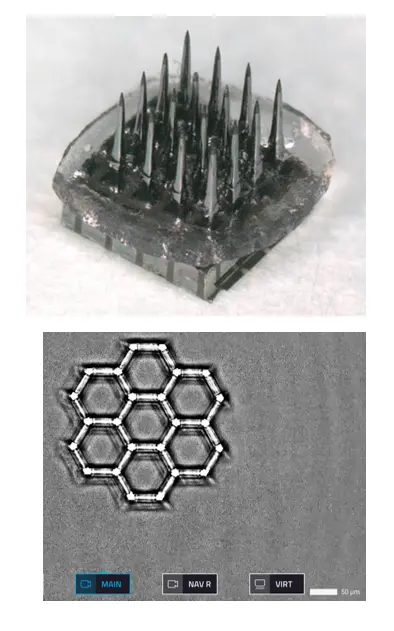
Our hydrogel coating technologies, are designed to improve biocompatibility and potentially reduce the immune system response to an implant. They allow the coating or adhesion of both passive and active (using e.g. inflammation reducing drugs) hydrogels in both chronic or biodegradable formulations for implants used in interstitial and neural tissue applications. Hydrogels can be provided as fully polymerized custom shaped sheets, applied through molding, dip coating, spray coating or shaped into full 3D constructs using 3D lithography. Utah electrode array provided courtesy by Blackrock Neurotech.
Biomarker sensors for metabolic, cardiac, anesthesia/pain management monitoring and cancer markers
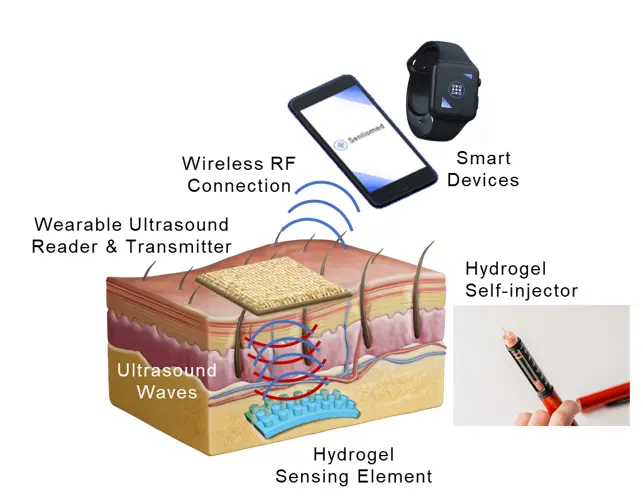
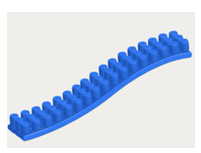
Hydrogel Sensor
- Injected into interstitial tissue
- Shrinks/swells in response to glucose
- Useful life of 14 days
- Biodegrades in 28 days
- No wires, invisible to observer
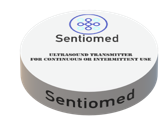
Ultrasound Reader & Transmitter
- Miniaturize for ease-of-use
- Transmits to Phone, Smart Watch, Display
- Option to monitor intermittently or attach with a band for continuous monitoring
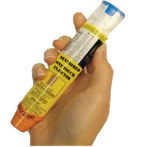
Self-Injector
- "Epi-pen" type self-injector

Software App
- Transmits glucose readings to Phone, Smart Watch, Display


Hydrogel Sensor
- Injected into interstitial tissue
- Shrinks/swells in response to glucose
- Useful life of 14 days
- Biodegrades in 28 days
- No wires, invisible to observer

Ultrasound Reader & Transmitter
- Miniaturize for ease-of-use
- Transmits to Phone, Smart Watch, Display
- Option to monitor intermittently or attach with a band for continuous monitoring

Self-Injector
- "Epi-pen" type self-injector

Software App
- Transmits glucose readings to Phone, Smart Watch, Display
Our injectable, 14 day biodegradable glucose monitor technology leverages smart glucose sensitive hydrogels that are patterned into frequency coded resonator structures, allowing easy transcutaneous readout using conventional clinically approved medical grade ultrasound with custom signal analysis software. Target applications are type I and type II diabetics while addressing the problems with current commercially available devices, such as surgically implanted or transdermal probes, potentially reducing infection, skin irritation and addressing cosmetic and attachment concerns.
The same underlying technology is very versatile and can also in principle sense other biomarkers and target molecules such as anesthesia and pain medication related targets, cardiac and blood markers and certain cancer markers.
